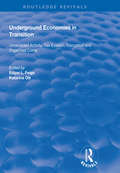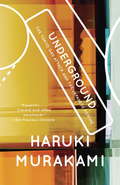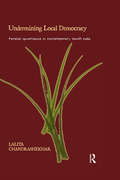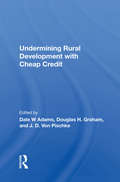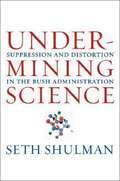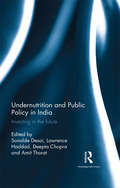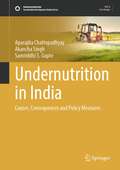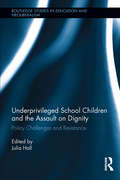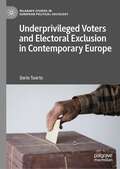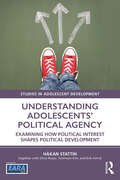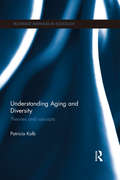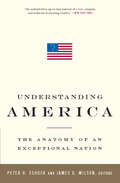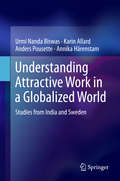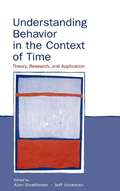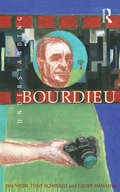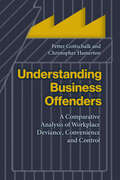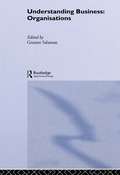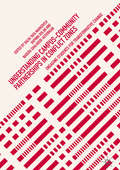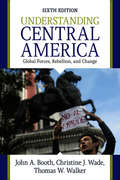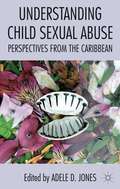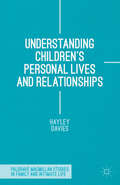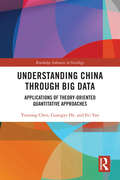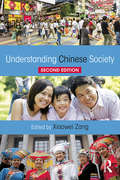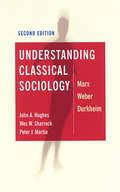- Table View
- List View
Underground Economies in Transition: Unrecorded Activity, Tax Evasion, Corruption and Organized Crime (Routledge Revivals)
by Edgar L. Feige Katarina OttPublished in 1999, this work examines the crucial role played by unofficial and underground activities in the transitional economies of Central and Eastern Europe and new independent states. Countries undergoing radical transformations from socialism to capitalism experience fundamental changes in institutional rules governing property rights, government regulations, taxation and the appropriate conduct of public service. Underground and unofficial activities represents non-compliant economic behaviours involving evasion, avoidance, circumvention, abuse and/or corruption of the institutional rules as well as efforts to conceal these illicit behaviours from the view of public authorities. The book employs the conceptual framework of the new institutional economics to elaborate the theoretical relationship between underground activities and overall performance of transition economies. The social, cultural and economic causes of unofficial activities are examined as well as their consequences for economic policy and performance. Policy issues include the relationship between tax evasion and corruption, the underground economy and organized crime, state and regulation, and methods and consequences of legalization of the underground economy.
Underground: The Tokyo Gas Attack and the Japanese Psyche (Vintage International)
by Haruki MurakamiIn this haunting work of journalistic investigation, Haruki Murakami tells the story of the horrific terrorist attack on Japanese soil that shook the entire world. On a clear spring day in 1995, five members of a religious cult unleashed poison gas on the Tokyo subway system. In attempt to discover why, Haruki Murakmi talks to the people who lived through the catastrophe, and in so doing lays bare the Japanese psyche. As he discerns the fundamental issues that led to the attack, Murakami paints a clear vision of an event that could occur anytime, anywhere.
Undermining Local Democracy: Parallel Governance in Contemporary South India
by Lalita ChandrashekharFocusing on Karnataka in India, this study examines the implications of the model of development sought to be introduced in the entire country through the governance reforms of the post-1991 period — a model that bypasses Panchayat Raj institutions (PRIs), resulting in a majority of the population being left outside the purview of development. These changes in governance resulted in, among other things, the prolific growth of NGOs in the country, particularly in Karnataka. Explaining how community-based organizations (CBOs) set up by these NGOs have made their way into rural Karnataka, this book expresses concern over how they now perform functions that rightly belong to PRIs following the 73rd Amendment to the Constitution which devolves 29 functions to local self-government, passing on the funds they receive from the centre to their district and village branches, though these should actually go to PRIs. The book argues that elected representatives have been put in place by the people at all levels, and it is they who should take decisions regarding the development of this country. In the post-liberalisation period, governance through institutions that eschew political decentralisation is fraught with hazards. Not only will avenues for the expression of people’s wishes be lacking in such a scenario, but there will also be increasing inequality, resulting in a skewed development. The inclusiveness which the present government seeks will elude them unless they restore and strengthen Panchayat Raj institutions.
Undermining Rural Development With Cheap Credit (Springboard Lvls 09-16 A Ser.)
by Dale W AdamsOriginally published in 1985, twenty-three chapters are brought together in 4 parts dealing with, respectively, problems in rural finance, interest rate policies, politics and finance, and new directions for rural financial markets. In an introduction it is argued that cheap and abundant credit is often regarded as essential for rural development but that actions taken on the basis of this assumption have given disappointing results. Low-interest policies and the improper use of financial markets are seen as the principal reasons for this. It is recommended that higher and more flexible interest rates are allowed and that little or no attention is given to target loans. Informal lenders are thought to offer valuable services therefore they should not be discouraged. More emphasis should be put on voluntary savings mobilization and access to formal loans by non-farm rural firms. It is concluded that many traditional agricultural credit programmes are counterproductive and that attractive product and input prices together with higher yields would be more powerful in stimulating agricultural development.
Undermining Science: Suppression and Distortion in the Bush Administration
by Seth ShulmanIt is the first book to focus exclusively on how this explosive issue has played out during the Presidency of George W. Bush and the first to comprehensively document his administration's abuses of science.
Undernutrition and Public Policy in India: Investing in the future
by Sonalde Desai Lawrence Haddad Deepta Chopra Amit ThoratDespite substantial economic growth, India has one of the highest undernutrition rates in the world; it is home to almost 40 per cent of the world’s stunted children. This volume assesses the status and causes of undernutrition in the country, and examines the effectiveness of policies designed to address undernutrition. The essays tackle wide-ranging themes and challenging issues including nutrition; water, sanitation and hygiene (WASH); maternal, neonatal and child health; Integrated Child Development Services (ICDS); Public Distribution System (PDS); crop procurement; and National Food Security Act 2013. With contributions from leading academic researchers, policymakers, as well as civil society representatives, this volume will be indispensable to scholars, teachers and students of public policy, development economics, development sociology, and Indian economy. It will also be useful to government institutions, think tanks and NGOs.
Undernutrition in India: Causes, Consequences and Policy Measures (Sustainable Development Goals Series)
by Aparajita Chattopadhyay Akancha Singh Samriddhi S. GupteThis book deals with issues related to undernutrition and anaemia in India. It establishes its interconnectedness with poverty, tribal living conditions, contraception usage, dietary diversity, and socioeconomic inequality. It addresses SDG 2, namely “end hunger, achieve food security and improved nutrition, and promote sustainable agriculture.” It puts forth the linkages between mother's economic empowerment and children's nutritional status, anaemia of women with particular reference to tribal women, and the issues associated with anaemia in India. It also delves into the relationship between contraceptive usage and anaemia level. It explores the proximate and intermediate determinants of undernutrition disaggregated at the state level in India. It elaborates the importance of ensuring food security and suggests policy measures to improve maternal and child health. The book is an asset for all researchers, academicians, clinicians and policy makers dealing with sociology, economics, public policy, social work, population study, gender issues, biostatistics, health, development, and nutrition.
Underprivileged School Children and the Assault on Dignity: Policy Challenges and Resistance (Routledge Studies in Education, Neoliberalism, and Marxism #7)
by Julia HallEvery day, children living in low-income communities have no choice but to grow up in a climate where they experience multiple unending assaults to their sense of dignity. This volume applies theoretical and historical insights to think through the increasingly undignified realities of life in economically marginalized communities. It includes examples of curricular challenges that low-income students in the US confront today while attempting to learn. Curricular challenges are analyzed as material texts that emerge out of student lived experiences in the economically disposed neighborhoods in which schools are located, and the dynamics of the schools and classrooms themselves. Attention is also paid to educators and students who push back against these forces in an effort to reclaim voice, identity and dignity.
Underprivileged Voters and Electoral Exclusion in Contemporary Europe (Palgrave Studies in European Political Sociology)
by Dario TuortoThis volume investigates the reasons behind voter turnout inequalities in contemporary Europe. It looks at the socioeconomic factors that can inhibit electoral participation at the individual level, and how these factors interact with the institutional constraints regulating access to the electoral arena, and considering the changes affecting the class system and occupational opportunities. The volume also reflects on the long-term effects of the 2008 Great Recession on the stability of democracy and the individual lives of voters, who are often deprived of institutional representation and left with the choice between anti-system protest and disengagement from politics.
Understanding Adolescents’ Political Agency: Examining How Political Interest Shapes Political Development (Studies in Adolescent Development)
by Håkan StattinThis ground-breaking volume shows that young people largely shape their own political development, and that to understand young people's political development, we must consider their political agency.Håkan Stattin explores the findings of an extensive longitudinal study of the political socialization of young people in Sweden from the ages of 13 to 28, which shows that, contrary to popular belief, it is not parents, peers, teachers or other key adults who are the primary agents in shaping young people's political development; it is their own self-directed political interest. Given that political interest is both an input and an output, the book examines how political interest affects young people's political interactions with their parents, and why young people and their parents perceive these interactions differently. It covers key issues such as the impact of political-interest-triggering events and civil unrest, the role of school and peers, parental involvement and the path from political interest to future political and civic engagement.Launching a new field of research internationally, this volume is essential reading for researchers, students, educators, and policy developers interested in young people's political and civic attitudes, engagement, communication, core values and the emergence of intrinsic political sophistication.
Understanding Aging and Diversity: Theories and Concepts (Routledge Advances in Sociology)
by Patricia KolbThe demographic phenomena of increased life expectancy, increasing global population of older adults, and a larger number of older people as a proportion of the total population in nations throughout the world will affect our lives and the life of each person we know. The changes will result in challenges and benefits for societies and people of all ages. These events need to be understood, explained, and their consequences addressed; sociological theories about aging are an essential part of this process. In Understanding Aging and Diversity: Theories and Concepts, Patricia Kolb presents important sociological theories and concepts for understanding experiences of older people and their families in a rapidly changing world. She explores concepts from phenomenology, critical theory, feminist theory, life course theory and gerotranscendence theory to explain important issues in the lives of older people. This book investigates similarities and differences in aging experiences, focusing in particular on the effects of inequality. Kolb examines the relationship of ethnicity, race, gender, sexual orientation and social class to international aging experiences. This book explores the relationships between older people and social systems in different ways, and informs thinking about policy development and other strategies for enhancing the wellbeing of older adults. It will be useful for students and scholars of sociology, gerontology, social work, anthropology, economics, demography and global studies.
Understanding America: The Anatomy of an Exceptional Nation
by James Q. Wilson Peter H. SchuckThe idea of an exceptional America remains controversial. In this dazzlingly comprehensive collection of essays, some of the nation's best scholars and thinkers take on the weighty task of sizing up Goliath in a way Americans and others can comprehend. These twenty studies in American exceptionalism provide a solidly researched and in-depth analysis on the current state of our institutions, our values, and our challenges for the future.
Understanding Attractive Work in a Globalized World
by Urmi Nanda Biswas Karin Allard Anders Pousette Annika HärenstamThis book discusses organizational values and their implications for perceived attractiveness and effectiveness of the workplace through cross-cultural research in India and Sweden. The authors provide information on how organizational values are conceptualized, presented and perceived by manager-level employees through cases from manufacturing, information technology (IT), healthcare, and education sectors in a developing and fast-growing economy like India versus a developed and stabilized economy like Sweden. Comparative results from these two very different countries provide knowledge that can be applied to make the workplace attractive in the context of globalized business processes. The authors present corporate social responsibility (CSR) and equal opportunities for men and women in the organization (EO) as important values in making the workplace attractive, where attractiveness is conceived in terms of organizational commitment and employees' intention to leave. The two selected values are particularly important as India is the first country in the world to come up with a mandatory CSR law, whereas Sweden has a long history of CSR and EO. The book demonstrates how work organizations in both countries are promoting these values to meet the challenges of attraction and retention of employees. The findings in this book are based on data gathered from various sources and sample groups in India and Sweden. The book generates insight and valuable information for researchers of organizational psychology, human resource management, cross-cultural management, as well as for work managers and HR professionals.
Understanding Behavior in the Context of Time: Theory, Research, and Application
by Alan Strathman Jeff JoiremanUnderstanding Behavior in the Context of Time reviews the research on temporal orientation and brings together the disparate social behaviors influenced by time perspective. Organized into four sections, each chapter includes theory, research, applications, and directions for future research. Some chapters outline novel theoretical approaches that help to expand and/or integrate existing theories. The second part focuses on individual level processes and reviews the conceptualization, measurement, and lifespan development of time orientation; the outcomes associated with various time orientations; and how temporal factors influence attitudes and persuasion. Part three explores the role of time within interpersonal and group level processes as applied to such areas as close relationships, group cooperation, aggression, organizational behavior, pro-environmental behavior, and cultural issues.This book will be of interest to social and personality psychologists, and the book's applied emphasis will appeal to health, environmental, and industrial psychologists.
Understanding Bourdieu
by Tony Schirato Jen Webb Geoff DanaherBourdieu's work is formidable-the journey is tough. Follow this French foreign legion-take an apple, take a hanky-but take this book.Peter Beilharz , Professor of Sociology , La Trobe UniversityPierre Bourdieu's work on the sociology of culture and language, on practical reason, on education, on citizenship and the cultures of poverty, and on a range of other topics is now coming to be seen as one of the 20th century's most important contributions to our thinking about the world. Understanding Bourdieu is a comprehensive and lucid introduction to his work. Measured and judicious, it's the best road map of this significant body of work currently available.John Frow, Regius Professor of Rhetoric and English Literature, University of EdinburghYou name it, Pierre Bourdieu has written about it. Now considered one of the most influential thinkers of the 20th century, he has left his mark on most of the 'big' theoretical issues in the world of contemporary theory: gender, subjectivity, the body, culture, citizenship, and globalisation. His terms are now commonplace: 'social capital', 'cultural capital', 'field', and 'habitus'.Bourdieu examines how people conduct their lives in relation to one another and to major social institutions. He argues that culture and education aren't simply minor influences, but as important as economics in determining differences between groups of people. Unlike the other grand systematisers Marx and Foucault, Bourdieu has tested these arguments in detailed fieldwork. His range is eclectic, his vision is vast, and his writing is often dense and challenging.Understanding Bourdieu offers a comprehensive introduction to Bourdieu's work. It is essential reading for anyone tackling him for the first time.
Understanding Business Offenders: A Comparative Analysis of Workplace Deviance, Convenience and Control
by Petter Gottschalk Christopher HamertonFocusing on understanding business offenders through an exploration of workplace deviance and crime, this book closely examines a number of illustrative contemporary case studies and underpins the analysis of original comparative fieldwork, with an interdisciplinary approach, which informs, develops, and augments the existing literature on white-collar criminology. The book contends, inter alia, that the traditional centrality of the individual actor within narratives of white-collar offending has receded somewhat in recent years despite being a founding artifact within its late twentieth- century discourse, and that therefore a detailed reassessment is overdue.
Understanding Business Organisations (Understanding Business Behaviour)
by Graeme SalamanOrganisational theory is vitally relevant to today's student of business. Understanding Business Organisations introduces the student to classic debates and new perspectives on organisations through a wide ranging but approachable selection of readings.This text:* considers why organisations matter to employees and customers * discusses theories of the organisation as a mode of empowerment and of control.Examining these theories in the light of current programmes of organisational change gives the book a case study element that will be invaluable for teaching and learning.
Understanding Campus-Community Partnerships in Conflict Zones: Engaging Students for Transformative Change
by Nadera Shalhoub-Kevorkian Dalya Yafa Markovich Daphna GolanThis book explores the opportunities and limitations of campus-community partnerships in Israel. In a conflict-ridden society with a struggling civic culture, the chapters examine partnerships at ten academic institutions, focusing on the micro-processes through which these partnerships work from the perspectives of students, NGOs, and disadvantaged communities. The editors and contributors analyse the range of strategies and cultural repertoires used to construct, maintain, negotiate and resist the various partnerships. Evaluating the various challenges raised by campus-community partnerships exposes the institutional and epistemological divides between academia and the community, and thus offers valuable insights into the ways partnerships can contribute to transformative change in conflict zones. This book will be of interest and value to researchers and students of campus-community partnerships as well as the anthropology of inclusion-exclusion and civic culture.
Understanding Central America
by Christine J. Wade John A. Booth Thomas WalkerUnderstanding Central America explains how domestic, global, political, and economic forces have shaped rebellion and regime change in Costa Rica, Nicaragua, El Salvador, Guatemala, and Honduras throughout their histories, during the often-turbulent 1970s and since. The authors explain the origins and development of the region’s political conflicts, their resolution and ongoing political change. This sixth edition provides analysis of citizens’ attitudes and participation through 2012 and up-to-date information on political changes in each of the five countries, including the 2013 and 2014 elections. Recent developments include dramatic changes in party systems in Honduras, Costa Rica, and Nicaragua; the extremely narrow victory of the newly elected FMLN president in El Salvador; and Guatemala’s prosecution of human rights abusers. This book is an essential resource, as it provides a comprehensive introduction to the region and a model for how to convey its complexities in accessible language.
Understanding Child Sexual Abuse
by Adele D. JonesThis is the first book to address the issue of child sexual abuse within a region of the world constructed as a 'paradise' in the language of global travel and thus makes a significant contribution to the international literature on the topic. The book follows on the heels of the most recent research into the topic (commissioned by UNICEF) and draws extensively from previously unpublished material. While child sexual abuse occurs in all countries, few books explore the nuanced conceptual, cultural and social behaviours which underpin it. The book is distinctive in that it addresses the limitations of dominant models for child protection that have emerged out of the richer countries of the West and which are often ineffective in the majority world and provides practice and policy examples for transforming child protection in sustainable ways. This edited volume includes contributions from a wide range of disciplines such as psychology, psychotherapy, law, social work, sociology, early childhood education and counselling.
Understanding Children as Consumers (SAGE Advanced Marketing Series)
by Dr David W MarshallWhat drives children as consumers? How do advertising campaigns and branding effect children and young people? How do children themselves understand and evaluate these influences? Whether fashion, toys, food, branding, money - from TV adverts and the supermarket aisle, to the internet and peer trends, there is a growing presence of marketing forces directed at and influencing children and young people. How should these forces be understood, and what means of research or dialogue is required to assess them? With critical insight, the contributors to this collection, take up the evaluation of the child as an active consumer, and offer a valuable rethinking of the discussions and literature on the subject. Features: * 14 original chapters from leading researchers in the field * Each chapter contains vignettes or case examples to reinforce learning * Contains consideration of future research directions in each of the topics that the chapters cover. This book will be relevant reading for postgraduates and advanced undergraduates with an interest in children as consumers, consumer behaviour and on marketing courses in general as well as for researchers working in this field.
Understanding Children's Personal Lives and Relationships (Palgrave Macmillan Studies in Family and Intimate Life)
by Hayley DaviesInformed by ethnographic research with children, Davies offers new sociological insights into children's personal relationships, as well as closely examining methodological approaches to researching with children and researching relationships.
Understanding China through Big Data: Applications of Theory-oriented Quantitative Approaches (Routledge Advances in Sociology)
by Fei Yan Yunsong Chen Guangye HeChen, He and Yan present a range of applications of multiple-source big data to core areas of contemporary sociology, demonstrating how a theory-guided approach to macrosociology can help to understand social change in China, especially where traditional approaches are limited by constrained and biased data. In each chapter of the book, the authors highlight an application of theory-guided macrosociology that has the potential to reinvigorate an ambitious, open-minded and bold approach to sociological research. These include social stratification, social networks, medical care, and online behaviours among many others. This research approach focuses on macro-level social process and phenomena by using quantitative models to statistically test for associations and causalities suggested by a clearly hypothesised social theory. By deploying theory-oriented macrosociology where it can best assure macro-level robustness and reliability, big data applications can be more relevant to and guided by social theory. An essential read for sociologists with an interest in quantitative and macro-scale research methods, which also provides fascinating insights into Chinese society as a demonstration of the utility of its methodology.
Understanding Chinese Society
by Xiaowei ZangThis second edition of Understanding Chinese Society provides a comprehensive, readable, and well-grounded introduction to the key issues affecting contemporary China. A thorough analysis is undertaken not only of China’s family patterns, education system, status, hierarchy, and ethnic diversity, but also of China’s mass media, legal system and social control, work, and cultural expression. As well as being thoroughly updated and revised throughout, this edition offers new chapters on urbanization, the environment, and civil society in China. A team of international experts guide students though social issues including: What are the key features of the family and marriage institutions in China? How are women and men faring differently in Chinese society today? How are minorities faring in China? How does the education system differentiate Chinese society? How are religion and cultural traditions expressed? Including handy pedagogical features such as a chronology of the People's Republic of China, further reading suggestions, and related novels and films, Understanding Chinese Society is suitable for anyone studying Chinese Culture and Society, Chinese Studies and Asian sociology.
Understanding Classical Sociology: Marx, Weber, Durkheim
by Peter J. Martin Wes Sharrock John HughesPraise for the First Edition: `Totally reliable... the authors have produced a book urgently needed by all those charged with introducing students to the classics... quite indispensable' - Times Higher Education Supplement This is a fully updated and expanded new edition of the successful undergraduate text. Providing a lucid examination of the pivotal theories of Marx, Durkheim and Weber, the authors submit that these figures have decisively shaped the discipline. They show how the classical apparatus is in use, even though it is being directed in new ways in response to the changing character of society. Written with the needs of undergraduates in mind, the text is essential reading for students in sociology and social theory.
